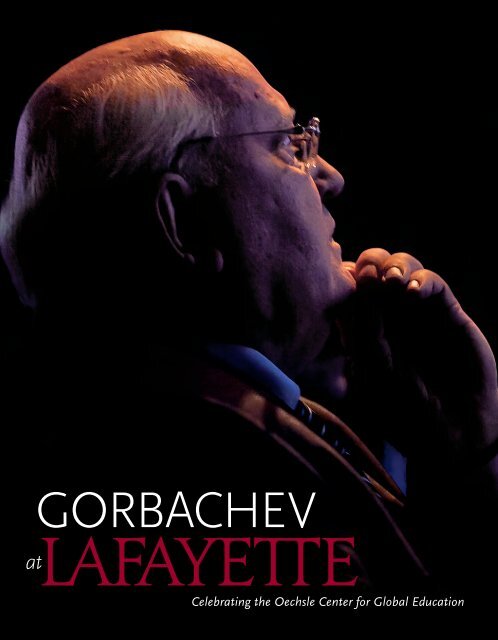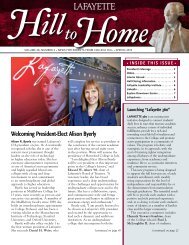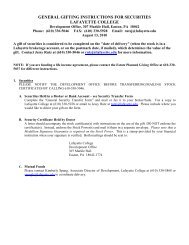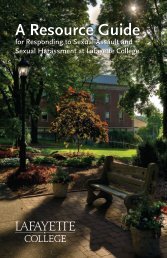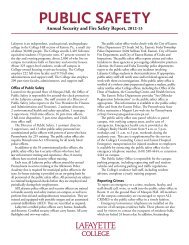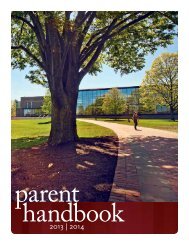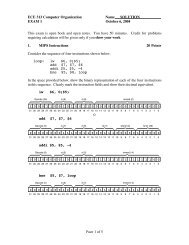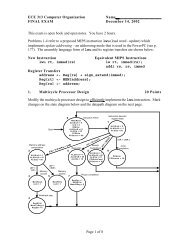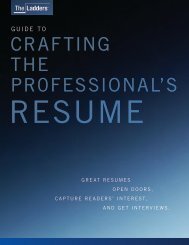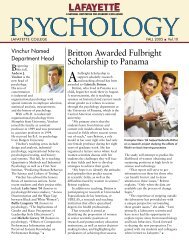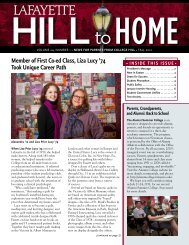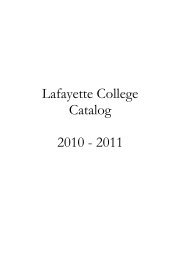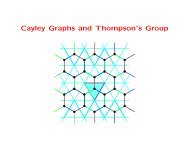GORBACHEV - The President - Lafayette College
GORBACHEV - The President - Lafayette College
GORBACHEV - The President - Lafayette College
- No tags were found...
Create successful ePaper yourself
Turn your PDF publications into a flip-book with our unique Google optimized e-Paper software.
Celebrating the oechsle centerfor global educationIt is hard to imagine a more fitting way to mark the creation of <strong>Lafayette</strong>’s newOechsle Center for Global Education than with an address by Mikhail Gorbachev.This memorable event on Oct. 19 was experienced by more than 3,600 people onour campus and by alumni and friends gathered in locations from coast to coast in theUnited States and abroad via streaming internet broadcast.our students were among the most enthusiastic attendees, and this is notsurprising. <strong>The</strong>y see the world as a global community, and they are engaging withthe oechsle center for global educationit energetically in a wide variety of ways. Indeed the impetus for a new, vibrant,interdisciplinary academic center has come from them.<strong>Lafayette</strong>’s vision for global education will be mostfully realized through the creation of the Oechsle Center, which willprovide a dynamic, collaborative learning environment that builds onthe <strong>College</strong>’s existing strengths. Interdisciplinary in its orientation andinnovative in its approach to learning and to global citizenship and service,it will include state-of-the-art instructional facilities, formal and informalmeeting spaces, and offices for faculty members whose teaching andresearch interests advance the center’s mission. <strong>The</strong> Oechsle Center willenable us to globalize the curriculum and add a global perspectiveto the educational experience of every <strong>Lafayette</strong> undergraduate.”<strong>President</strong> Gorbachev exemplifies the type of visionary, transformativeleadership which we hope the Oechsle Center for Global Education will inspire — andprepare — our students to emulate as they engage with the world throughout their ownlives and careers. I hope you will enjoy this special publication commemorating his visitto <strong>Lafayette</strong>.Daniel H. Weiss<strong>President</strong>, <strong>Lafayette</strong> <strong>College</strong>January 2012—<strong>President</strong> Daniel H. Weiss1
Mikhail Gorbachevand Daniel H. Weiss
“Some of the new generation sitting here will bepresidents, some prime ministers. <strong>The</strong>y must prepareto transform their country and the world.”—mikhail gorbachev
<strong>The</strong> Oechsle Center will enable <strong>Lafayette</strong>to add a global perspective to everystudent’s educational experience.Walter Oechsle ’57(center)
10As a <strong>Lafayette</strong> student, Jacqueline Olich ’92 studied in Mikhail Gorbachev’sSoviet Union. Now the associate director of the Center for Slavic, Eurasian,and East European Studies at the University of North Carolina, she greeted himwith Edward Ahart ’69, chair of <strong>Lafayette</strong>’s Board of Trustees, and Joshua Sanborn,professor of history 11 and chair of Russian and East European Studies.
“Mikhail Gorbachev exemplifies the type ofvisionary, transformative leadership which wehope the Oechsle Center for Global Educationwill inspire — and prepare — our students toemulate as they engage with the world.”—Daniel H. Weiss1213Matt Grandon ’12, president of Student Government,spoke with Mikhail Gorbachev and his longtimeinterpreter, Pavel Palazhchenko.
GORBACHEv CAPTivATESBy Geoff Gehman ’80While contemplating a <strong>Lafayette</strong> student’s request to rate his radicalreforms, Mikhail Gorbachev leaned on the lectern in Kirby SportsCenter. <strong>The</strong> Soviet Union’s last president could have reviewedhow he helped bring free speech to his fellow Russians, or helped unify Germanyby demolishing the Berlin Wall, or helped end the Cold War by signing a nucleardisarmamenttreaty with the United States. Instead, he delivered a witty evasionreminiscent of the late U.S. <strong>President</strong> Ronald Reagan, his former foe and friend.“Well, if we answer this question,” he said through a translator, “what will remain forthe college to study? As I understand, today you are inaugurating a research center.That shows that you are among those who will develop the kind of intellectualproduct that will give people knowledge. I congratulate you on this initiative andI wish you success.”<strong>The</strong> packed arena echoed with laughter at a savvy 80-year-old statesman dodging atricky question and a trickier answer. Yet his statement had a measure of truth forJacqueline Olich ’92, who considers Gorbachev one of her academic ambassadors.It was his human-rights “experiment” in the late 1980s that led her to study Russian,which led her to study twice in the Soviet Union, which led to her career as professorand associate director of the Center for Slavic, Eurasian, and East European Studiesat the University of North Carolina. Gorbachev’s visit to <strong>Lafayette</strong> was so importantto her that she flew that day from North Carolina to Easton for a close encounterwith one of her humanitarian heroes.17
WISE AND REVOLUTIONARYGorbachev’s speech was the inaugural lecture for and celebration of the <strong>College</strong>’sMikhail Gorbachev has earned the gratitude of the world and the respect of all whovalue wise, principled, and courageous leadership.”planned Oechsle Center for Global Education. <strong>The</strong> new building will includefaculty offices, seminar rooms, and state-of-the-art classrooms with internationalconnectivity, with space for public lectures and common areas to encourage dialogueabout global issues. Building on the <strong>College</strong>’s historic strengths, a significantly revisedmajor in international affairs will be the core of the global education program. <strong>The</strong>curriculum also will include study-abroad courses, a capstone experience, communitybasedlearning, and area-studies programs.Several spectators in the arena were directly affected by Gorbachev’s reforms. Angelikavon Wahl, associate professor of international affairs, attended the Nov. 9, 1989, openingof the Berlin Wall, which allowed residents of East Germany to freely visit residents ofWest Germany, where she grew up. She discusses her role as an eyewitness to historyin her First-Year Seminar, “Overcoming the Wall.” One of her students is KarinaGoodman ’15, whose father helped negotiate Germany’s unification as an official forthe U.S. Department of State.In addition, Gorbachev’s visit marked <strong>Lafayette</strong>’s historic 1988-1991 participation asone of the first six U.S. colleges and universities selected for an exchange programwith schools in the U.S.S.R. Endorsed by both Gorbachev and Reagan, the programallowed students like Olich to experience Gorbachev-sponsored freedoms of worship,election, and capitalism. <strong>The</strong> other U.S. schools involved were Harvard, Yale, Stanford,Williams, and University of Maine.Gorbachev’s visit, which coincides with the 20th anniversary of the dissolution of theSoviet Union, was particularly personal for Julia Brodsky ’13, whose parents hail fromBelarus. Without Gorbachev’s reforms, she insists, her parents probably would not havesettled in the United States, where she was born in 1991, the year Belarus attained itsindependence after seven decades as a Soviet Socialist Republic.An overflow crowd of more than 3,600 people came to hear a rare combination ofrevolutionary, entertainer, and icon. Gorbachev is the first <strong>Lafayette</strong> guest to havebeen awarded the Nobel Peace Prize, been awarded a Grammy for a children’s“I probably wouldn’t be here if it weren’t for Gorbachev,” said Brodsky, a psychologymajor and Russian minor. “My parents joked that I should thank him by bringing himflowers.”recording (with Bill Clinton and Sophia Loren, no less), and had his face printed onacid-laced blotter sheets. He is also the first world leader to have his face posted on thescoreboard in Fisher Stadium, adjacent to the sports center.Gorbachev started his speech with a symbolic olive branch. He recalled a nearcatastrophe when geese migrating from the Soviet Union to North America were nearlymisidentified as strategic bombers. It was a sobering reminder to Soviet and AmericanIn welcoming Gorbachev, <strong>President</strong> Daniel H. Weiss said, “For his leadership inending the Cold War and advancing the cause of freedom throughout the Soviet Unionand around the globe, and for his steadfast commitment to fundamental human rights,leaders to end the threat of nuclear war, for the sake of all species. “Geese continue tomigrate between our countries,” he said, “and I thank them, because whether we argueor get along well, they are still devoted and committed to our two countries.”1819
<strong>The</strong> statement typically reflects concerns held by Gorbachev, who founded a think tankfor Nobel Peace Prize laureates. His earthy earnestness pleases Oksana Tereshchenko,a volunteer with <strong>Lafayette</strong>’s Russian and East European Studies program. A native of theChanged the World” awards to Kenyan engineer Evans Wadongo, who invented a solarpoweredlantern. His 80th-birthday gala featured the Scorpions, a German rock band,performing “Wind of Change,” their German-unification anthem.Russian city of Volgograd, she believes that Gorbachev’s reforms allowed her to readforeign newspapers without fear of being punished and travel abroad without fear ofbeing unable to return to her homeland. Today, she lives with her American husbandGorbachev is “definitely a well-rounded world leader,” DeRosa said. “Most politiciansneed to be that way.”in Phillipsburg, N.J., and tutors undergraduates about everything from the Battle ofStalingrad to environmental crises.Most politicians lack Gorbachev’s courage of conviction. During his speech, he attackedthe American economy’s “sick” dependence on the military-industrial complex for itsSPEAKING WITH CONVICTIONGorbachev recalled that his first nuclear-disarmament summit with Reagan —November 1985 in Geneva — was strained initially. (He noted that Soviet and Americanleaders had not had a single summit meeting during the previous six years of Cold Wartensions. “To me, it still sounds amazing.”) “We just accused each other for the state ofthe world, and I said, ‘Reagan is indeed a conservative. He is a dinosaur!’” A few dayslater, Gorbachev read in an American newspaper that Reagan, in turn, had called him “aprosperity. “Seventy-five percent of the world’s military expenditures are made in theUnited States of America. It seems that things are beginning to change in this regardin this country, but nevertheless we see that our American friends are still excessivelyconcerned about their security and trust no one. That is not a good thing.” Americancommanders, he added, also suffer from an arrogance complex. “We are used toAmerica giving advice to everyone, America pushing one model, like instant coffee, toall countries.”diehard Bolshevik.”Gorbachev saved his harshest criticism for his Soviet rivals. Russia’s economy has been<strong>The</strong> superpower leaders overcame these unpleasantries, which Gorbachev jokinglycalled “pleasantries,” to sign a 1987 treaty that banned their nations’ short-range andintermediate-range nuclear missiles. <strong>The</strong>y also became good friends; in 2009 Gorbachevhonored Reagan by visiting Eureka <strong>College</strong>, Reagan’s alma mater.“ruined” by the “shock-therapy” tactics of the late Boris Yeltsin, the first president ofthe Russian Federation. <strong>The</strong> country’s political instability has been aggravated by PrimeMinister Vladimir Putin’s refusal to respect the independence of Russia’s independentstates.<strong>The</strong>se back-room machinations fascinated Nicholas DeRosa ’12, a conservativeRepublican fascinated by Reagan, a role model for conservative Republicans. <strong>The</strong>government and law/international affairs major also was impressed by Gorbachev’simpressive credentials. In 2011, Gorbachev presented one of his first “Man WhoPotent opinions like these have made Gorbachev unpopular among Communisthardliners, said Rado Pribic, Williams Professor of Foreign Languages and Literaturesand co-chair of international affairs. According to Pribic, Gorbachev’s Russian enemiesblame him for introducing the freedoms of speech and election that led republics2021
to declare their independence, which led to the breakup of the Soviet Union. Somecritics remain angry at Gorbachev’s late ’80s campaign to reduce rampant alcoholism bylowering the supply and raising the price of liquor, which led to a boom in black-marketbe replaced by democratic anarchy. After all, didn’t banks bailed out by governmentspay huge bonuses to their chief executives? “Was there a crisis,” he added, “for thosepeople?”distillery, which led to a dramatic shortage of sugar.After filing his final answer, Gorbachev left the stage to his third standing ovation. Olich“Many Russians are not happy with Gorby because he gave away the empire,” saidPribic, a coordinator of <strong>Lafayette</strong>’s 1988-1991 Soviet exchange program. “He was toomuch of an idealist; he wasn’t enough of a pragmatist to defend his own turf. Put it thisway: not too many people celebrated his 80th birthday in Russia.”didn’t mind that she never got to ask him what children’s books he read, information shecould use in her graduate seminar in 20th-century childhoods in the United States andthe Soviet Union. She received something better: a happy reunion with her <strong>Lafayette</strong>mentors, an inspiring speech, and a photograph with Gorbachev, the statesman whostarted her scholarly sojourn. As she Tweeted to a former college roommate, “All thatGorbachev ended his lecture by turning a speech into a commencement address. Hetime I spent with my little Russian-lang index-flash cards @LafCol was worth it.”advised students to marry well, for love rather than “cold calculation.” His marriageto fellow student Raisa Maximovna lasted 46 years, during which he supported hercampaign to improve blood-cancer treatments for youngsters. Gorbachev’s tribute to“Gorbachev Captivates” first appeared in the Fall 2011 issue of <strong>Lafayette</strong> Magazine.zhis late wife touched Olich, who called the couple’s marriage “a strikingly fresh andmodern partnership, particularly for a Soviet leader.”Gorbachev then answered five questions relayed by Weiss and translated by PavelPalazhchenko, his interpreter for 27 years and author of three Russian-Englishdictionaries. One student essentially asked if Russia was better or worse off not beingin the Soviet Union. Gorbachev pointed to a poll conducted by his foundation thatrevealed that while 80 percent of Russians regret the dissolution of the U.S.S.R., only 9percent want to restore it.By the final question Gorbachev was relaxed enough to lean his elbow on the lectern,a classic debating pose. He debated himself while analyzing last spring’s people’srevolutions in Egypt and Libya. <strong>The</strong>re is no need to “panic,” he said, that tyranny will2223
Address by Mikhail Gorbachev<strong>Lafayette</strong> <strong>College</strong>, Oct. 19, 2011Introductory Remarks by PRESiDENT DANiel H. WeiSSGood evening. It is my special pleasure, as <strong>Lafayette</strong>’s president, to welcome you to thiscelebration of the Oechsle Center for Global Education.Grossman House is being made possible through the generosity of trustee RichardGrossman ’64 and his wife, Rissa. Richard is with us this evening, and I would like to askhim to stand and be recognized for the important contribution he and Rissa have madeto global education on campus.<strong>Lafayette</strong>’s vision for global education will of course be most fully realizedthrough the creation of the Oechsle Center, which will provide a dynamic and fullyI cannot think of a more fitting way in which to mark the creation of this vibrant newacademic hub on our campus than with an address by the distinguished global leaderwho will present the Center’s inaugural lecture.collaborative learning environment that builds on the <strong>College</strong>’s existing strengths. Tobe located at a major campus gateway — directly across McCartney Street from WatsonCourts — the Center will feature state-of-the-art instructional facilities, formal andinformal meeting spaces, and offices for faculty members whose teaching and researchWe have invited such a renowned international figure to address us tonight becausewhat he has to say is enormously important. But Mr. Gorbachev also is here because heinterests advance the Center’s interdisciplinary mission. <strong>The</strong> Center is now in the earlydesign phase, with construction to begin during the coming academic year.exemplifies the type of visionary, transformative leadership which we hope the OechsleCenter for Global Education will inspire — and prepare — our students to emulate asthey engage with the world throughout their own lives and careers. Interdisciplinary inits orientation and innovative in its approach to learning and to global citizenship andservice, the Oechsle Center will enable us to globalize the curriculum and add a globalperspective to the educational experience of every <strong>Lafayette</strong> undergraduate.Our vision for this facility would have remained only a dream without the devotedinvolvement of two remarkable individuals, Walter and Christa Oechsle. Both are nativesof Germany who graduated from American colleges: Christa is an alumna of Hofstra andWalter is a member of <strong>Lafayette</strong>’s Class of 1957. Walter majored in history here, studiedphilosophy at the University of Pennsylvania, and earned an MBA in finance fromNew York University. <strong>The</strong> founder of Oechsle International Advisors and a leadingLast year, our faculty took a significant step toward achieving these goals with thecreation of a new international affairs major to engage students more deeply withauthority on international money management, he understands well why a globalperspective is absolutely fundamental to our graduates’ success in the 21st century.specific geographic regions and thematic issues. We also appointed the first professorto be based entirely in that interdisciplinary program.<strong>The</strong> Oechsle Center for Global Education is not Walter and Christa’s first major giftto <strong>Lafayette</strong>. <strong>The</strong>y have endowed one of our largest scholarships, a fund that providesNext fall, a residence hall expressly designed to provide a supportive living-and-learningenvironment for students interested in global topics will welcome its first occupants.financial aid to international students. <strong>The</strong>y also enabled the <strong>College</strong> to convert AlumniMemorial Gymnasium into Oechsle Hall, a new home for two of <strong>Lafayette</strong>’s programsin the sciences.2425
At the dedication of Oechsle Hall in 2002, Walter explained that he and Christa hadbeen motivated to support that facility because <strong>Lafayette</strong>’s popular and importantprograms in psychology and neuroscience were clearly, to use his term, “underdomiciled.”In making a gift to create the Oechsle Center for Global Education, theyfunded a program that was, at that point, completely un-domiciled. But soon, thanksto their generosity, we will have a magnificent new facility that will embody theircommitment to <strong>Lafayette</strong>, to its students, and to our shared vision of global education.Address by Mikhail Gorbachev<strong>Lafayette</strong> <strong>College</strong>, Oct. 19, 2011Perspectives on Global ChangeI recently turned 80, and for 55 years I’ve been involved in politics. It meant a lot forme, my family, my country, and the world, because it was my destiny to be on the cuttingedge of events. Today I will tell you about that.Unfortunately, Christa was unable to be with us this evening. But Walter is here,and I would like to ask him to stand so that we may all express our gratitude for theextraordinary gift which he and Christa have made.At the end of the 1980s, because of the efforts, above all, of our two countries, theUnited States and the Soviet Union, but also in cooperation with other countries, wewere able to put an end to the Cold War and to lead the world away from the abyss. Wehad been close to the possibility of the nuclear danger becoming a real conflict. ThatAlthough the Oechsle Center does not yet exist as a physical space, in a very meaningfulsense its work formally begins with tonight’s inaugural lecture. Our speaker is widelyrecognized as one of the very few individuals who have played a truly pivotal role inreshaping the world in a positive way since the end of World War II. For his leadershipin ending the Cold War and advancing the cause of freedom throughout the SovietUnion and around the globe, and for his steadfast commitment to fundamental humancould have happened even without a political decision to use nuclear weapons. <strong>The</strong>rehad been failures in the control systems of those terrible weapons. Let me give you oneexample. A flock of geese flying from the Soviet Union as a normal migration from theirsummer places in the direction of the United States — something that geese do annually— were detected by the American radar systems, and they appeared like Soviet strategicbombers flying toward the United States via Canada.rights, Mikhail Gorbachev has earned the gratitude of the world and the respect of allwho value wise, principled, and courageous leadership.I can’t imagine the reaction when this mistaken detection was made, but fortunately,the reaction was wise, and certainly the people who were in that area were responsibleIt is now my great honor and privilege to welcome Mikhail Gorbachev.zpeople who fully understood what the use of nuclear weapons could have led to.<strong>The</strong>refore, the reaction was calm, and in a few minutes they realized that it was just aflock of geese. I once gave that example during my lectures in America and later I wasgiven a little statue of a goose. That is an image, the goose, which continues to migratebetween our countries, and I thank those geese, because whether we argue or get alongwell, those geese are still devoted and committed to our two countries. And I still havethat souvenir in my home.2627
In order to end the Cold War, to start the process of nuclear disarmament, andto implement many other changes, certain important things had to happen. Certaindecisions had to be made — perhaps the most important decisions of the 20th century.When nuclear weapons were first invented, Albert Einstein said, “We need a new way ofcountry for ordinary people was still difficult (of course, the standard of living was notto be compared with the United States) — people were working and sacrificing in orderto maintain nuclear parity. So, we went to that summit meeting with Ronald Reagan.He came to Geneva from Washington, and I came from Moscow.thinking, because mankind has been deprived of its immortality.” And then Chernobyl— the explosion of just one nuclear reactor, and the Soviet Union had a lot of difficultyin stopping that process. We had to spend enormous amounts of money to take thesituation in hand, more than 18 billion dollars, just to clean up the consequences ofChernobyl. That was just one reactor, and a vast country had to confront that danger.Later, scientists said that one Soviet strategic missile with multiple warheads containedthe power of 100 Chernobyl explosions. Just one missile! Those who went throughChernobyl or a similar experience, those who were involved in decision-making aboutnuclear weapons, all those people understood the kind of responsibility that they wereshouldering. <strong>The</strong>refore, the end of the confrontation, when George Bush and I, at thesummit in Malta, stated we no longer regarded our two nations as enemies, that meantthat the Cold War had ended.That summit was an amazing event that is still engraved in my memory. <strong>The</strong> firstconversation was a one-on-one conversation while members of our delegation wereaway smoking. This introductory conversation was supposed to be very brief, but itwent quite long. <strong>The</strong>n I returned to my delegation, and they asked me, “What’s yourimpression of Ronald Reagan?” At that time, of course, Reagan was called a hawk inthe international media. I said, “We had a real argument — a lot of bickering, a lot ofmutual accusations.” We just accused each other for the state of the world. And I said,“Reagan is indeed a conservative, and, I would say, more: he is a dinosaur!” Three daysafterwards, in an American magazine, we read a story about the same question beingput to Reagan: What’s your impression of Gorbachev? He said, “Gorbachev is a diehardBolshevik!” It was that exchange of “pleasantries” that started our work.That happened as if it were something quite normal. But, again, before it all happenedwe had to make a decision, a commitment, to normalize relations with the UnitedStates. That was only possible when the new generation of leaders came to power in theSoviet Union, when my generation came to leadership. I recall that as a very difficulttime. When we were discussing the proposals that the Soviet Union planned to maketo our U.S. partners, we believed that cooperation with the United States was necessary.(At the height of tensions during the Cold War, for six years the Soviet leaders andAmerican leaders had not had a single summit meeting. To me, it still sounds amazing.)We believed we needed to act because of the security issues we were facing and becauseof the enormous amounts of money we were spending on the arms race, while life in ourBut in less than three days at that summit, we made enormous progress and startedto build initial trust. It was on the night of the last day of the summit that the finaldocument was produced. It stated that a nuclear war cannot be won and must neverbe fought. That meant that if we did not intend to fight a nuclear war, why have somany nuclear weapons? At that time, 96 percent of the nuclear weapons in the worldwere in our two countries. It was madness to continue the arms race, and it was onlybecause of the terrible mistrust that it continued. <strong>The</strong> leaders of the two countries thatdefeated the plague of Nazism, that had been allies and partners, were now in a state ofconfrontation, leading opposing military alliances. In that same statement, we also saidthat our two nations will not seek military superiority.2829
I think the first part of that statement — about the need for nuclear disarmament, abouta nuclear war that must never be fought — is being fulfilled. We are moving toward asomething bold, something dramatic. That meant that we, the leaders of the country,had to assume responsibility for such bold change.nuclear-weapon-free world, even though, I believe, we are moving rather slowly, anda lot more could be done. But as for the obligation not to seek military superiority, Imust say that our American partners have not fulfilled that pledge. Even now, when wediscuss the need to implement comprehensive nuclear disarmament, and even whenpositive steps are agreed between our two nations, we still face this question: Whathappens if all nuclear weapons are destroyed? What will remain in the world? Well,mostly what will remain is the military power of the United States. Seventy-five percentof the world’s military expenditures are made in the United States of America. It seemsthat things are beginning to change in this regard in this country, but nevertheless wesee that our American friends are still excessively concerned about their security andtrust no one. This is not a good thing, now that the Soviet Union doesn’t exist as apartner to the United States — which I regret. I regret that we were not able to preservethis vast country. But also from the standpoint of international relations, we developeda partnership between the Soviet Union and the United States during our final years,and that was a very serious partnership. Now, of course, in a different situation, we stillneed to address the issues of security, and we believe that those issues can be resolved.Perestroika was a difficult process in our country. Gradually we were pushing forwardtoward this democratic breakthrough, toward the end of the totalitarian system, towarddemocracy and freedom. We were also moving step by step toward a new economy,toward market economics. But the most important thing was freedom and glasnost.Even today, some people say — I’m referring to the writer Aleksandr Solzhenitsyn.(We recently visited Wyoming. He spent some time in that state when he lived in thiscountry.) He was a great Russian writer, a great humanitarian, and a fighter againstStalinism. But one day he criticized me, saying, “Gorbachev’s glasnost ruined thecountry.” I decided to respond immediately. I said that if it had not been for glasnost,there would be no perestroika, no change toward democracy. <strong>The</strong>re would have been nofreedom of movement, no freedom of immigration — and then Aleksandr Solzhenitsynwould probably continue to live in Vermont, cutting firewood for his fireplace. Itwas said maybe a little jokingly, but it was exactly true. He was able to return to hiscountry as a result of the changes that happened in our country. He continued to worktoward democracy and freedom. But this example shows that even some people likeSolzhenitsyn, who had experienced enormous hardship during the old system, did notAs we were moving toward this change, of course, it had to be preceded byfully understand the meaning of what we were doing.fundamental changes within the Soviet Union. Throughout our society, people wereunhappy, concerned about the state of the country. <strong>The</strong>y were worried about nuclearwar, but they also were demanding general change in the country. <strong>The</strong> phrase, whichhas been recorded in the history of our country and of the world, was “We can nolonger live like this. We can no longer live as before. We demand change.” That wasthe demand throughout our society. We faced a situation that required us to propose<strong>The</strong> moment came when we concluded that the small steps we had taken were notproducing the expected results, not allowing people to move forward, to take initiative.We needed to do something bolder to move toward freedom. We understood that if wejust changed the ideology, liberalized the culture, and so forth, it was not enough. It wasnecessary to change the system. This is when we announced that we would implement3031
political reforms. And, of course, that’s not just for leaders to do. It’s something theleaders can do only having consulted the people. We initiated a debate on those issues,and, in effect, it was a kind of national referendum that preceded the national partyconference that we convened to discuss political change.When the Politburo met the next day to discuss the results of the elections, Icongratulated members of the Politburo. I said, “This is a victory for us.” But I saw theywere not in agreement with me and I said, “Why are you unhappy? We have conductedfree elections at the most pivotal time of perestroika, and this vote means supportfor our reforms and our political course.” But the Politburo said, “Those are not real<strong>The</strong> 19th Party Conference, in 1988, adopted amazing decisions. We proclaimedfreedom as our goal. We proclaimed the movement toward freedom of speech andfreedom of religion and freedom of political choice — toward all freedoms. People mustbe free. Only a free individual could respond to the challenges we were facing at thattime. We also decided that, in effect, we would change the entire system and build asystem for a free country, a system of political democracy, and that we would implementa democratic constitution based on the right of people to know everything and to beCommunists.” Indeed, the bureaucracy that had ruled the country for decades now hadto compete for its legitimacy, had to prove whether it was legitimately holding all thosepositions in a democratic contest without any control over the results. (I would say theonly control we had was to make sure that no one undermined the elections.) I believethe elections of 1989 and 1990 were the most free and democratic elections. Duringthose elections, new people came to power, and this started a real battle against thereformers. That resistance was quite strong.involved in making decisions on all political issues. <strong>The</strong> conference lasted for 10 days,and during those 10 days, people were watching everything on television. We showed allof it openly. <strong>The</strong> theaters were empty, because the main show was not in the theaters,but in the Kremlin.We did not succeed in fully implementing perestroika the way we wanted to, but wewere able to carry it far enough, to the point where there could be no turning back.This has now been proven. <strong>The</strong> 20 years that have passed since the introduction ofperestroika have been difficult, but I believe we have not turned back and can still<strong>The</strong>refore, we call 1988 the real beginning of perestroika. <strong>The</strong> previousyears were preparation for perestroika — preparation of the society and the party.This was followed by free elections, and perestroika was gaining momentum andaddressing real challenges. <strong>The</strong> elections actually gave a lot of support to members ofthe Communist Party. <strong>The</strong>y were competing with other candidates, and on any ballotthere were several names. <strong>The</strong>re was a renovation of power as a result. Eighty-fourpercent of the delegates elected to the parliament were members of the CommunistParty, something that had never before happened in our country.continue the transformation of our country. <strong>The</strong> breakup of the union of republicsaffected very negatively the subsequent course of events in our country. During thetime of Boris Yeltsin, shock-therapy reforms were implemented. That shock therapyruined the financial system, the economy, the industry. We are only now moving towardthe levels of production of 1990, which was the last normal year of perestroika. A bigblow was dealt to our country. Now I think there is, again, an opportunity to moveforward. But a lot of time was wasted, and that is why we have poverty in our country,why we have not been able to rebuild the manufacturing base, and so on.3233
I would say that Russia today is a country in transition. We are moving towarddemocracy. This transition is only halfway down the road, perhaps a little more. That iswhy we have seen some setbacks. We are having difficulty fighting corruption and manyother problems, and there is a lot of work. I’m saying that to you because you need tounderstand what is happening in the country. Above all, you need to understand thatRussia will not go back. But Russia is facing a lot of problems.reference points, goals for moving toward a future not of hostility and divisions butone that will bring people together. After the disappearance of the Soviet Union,unfortunately, some people in this country, which remained as the only superpower,began to push the idea of creating a new empire, a special kind of empire. I was amazedwhen I heard that, including from some American scholars who actually promotedthis idea. <strong>The</strong>y said that the Cold War had been won by the United States, and theSoviet Union had been broken up, so why change anything in America — we shouldSpeaking of Russia’s foreign policy and relations with the United States,I would say that after the breakup of the Soviet Union, we did not succeed in staying thecourse in our relations. <strong>The</strong> opportunities that existed after the end of the Cold War— opportunities opened up by glasnost, by freedom, by democracy — were not usedproperly. <strong>The</strong> entire world situation did not develop positively. We saw deteriorationwhere there should have been positive movement toward a new world order. Pope JohnPaul II, whom I regarded as my friend — we were very close — once said, “We needa new world order, one that is more stable, more humane, and more just.” He said itjust continue in the same way, going toward more triumphs. Now we hear, for example,from Alan Greenspan. A few days ago he was asked what was happening in the economy,and he said, “Well, I don’t understand what’s happening in the economy and I’mconfused about what needs to be done.” I am mentioning him as an example. I continueto respect him as a very knowledgeable person, but it means that we are reaping theconsequences of a strategy that was not conducive to cooperation and partnership, toliving in this new global situation. Instead, I think the kind of vision that existed at thattime was pushing us back rather than forward.best; no one has been able to improve on that characterization of a new world order.We still are facing the problem of building such a world order. We are facing problemsof the environment, of backwardness and poverty, of food shortages, all because wedo not have a system of global governance. We are living in a global world. <strong>The</strong> politicalprerequisites for a global world do exist, they have been created. But we were not readyand we still have to learn to live in a global world. This is the No. 1 problem, and a lotdepends on how countries like the United States will act, how Europe will behave, howRussia will behave.I believe that, today, just about everyone agrees, including here in this country, thatthe idea of building a global American empire is a bad idea that was mistaken from thestart. It was something that failed, and I think it was a political mistake to propose it.More important, I think people in America are now giving serious thought to the futureof their own country and giving this priority. I believe this is an important change. Sixor seven years ago, when I spoke in this country to a huge audience in a universitybasketball arena, a young man asked, “Mr. Gorbachev, what would you recommend?What should we do to change things in this country? Things are getting worse. What’sI must say that I have been disappointed during these past years by many developments.If we look at the course of events of the past 15 years, I would say that we are still livingin a time of trouble and confusion, a time when the world needs very clear politicalyour advice?” I said, “Giving advice to America may not be safe and, secondly, is useless.We are used to America giving advice to everyone, America pushing one model, likeinstant coffee, to all countries.” But now in America, people understand that this was3435
a mistake that created a mess and must somehow end. Another young man asked,“<strong>President</strong> Gorbachev, you are an experienced person, you have given your life toleadership. What is your advice as you are watching what is happening in this country?”I said, “Well, I don’t want to give you a kind of menu or calendar for change, but II am sure. It’s very important for the military-industrial complex to understand that,because a lot of brainpower is concentrated in that sector. I believe that brainpowershould move from military plans to other goals, and I believe the people who are nowworking there can make a great contribution to change.believe that American needs its own perestroika.” <strong>The</strong> entire crowd gave me a standingovation. I concluded that change was coming to America. It was a crowd of students,people from politics and business, and just ordinary people.A new generation is coming. I see those people sitting here. Some of them will bepresidents, some prime ministers. I would like to welcome this new generation. <strong>The</strong>meaning of your life must not be just to have a good time. Of course, you must have aWhat we saw during the last presidential election was, I believe, unprecedented,certainly in my lifetime. <strong>The</strong> entire nation was involved, and all the issues were discussedthoroughly. It was a fascinating experience and ended in a result that maybe surprisedAmerica itself. I believe it was the right result. I believe it was the choice of the people,who expressed in this way their expectations and their hopes. I spoke just before thislecture to a person from an American oil company that I know. He is pleased about thecooperation that they have established in Russia, with Russian companies. But I mustsay that when people speak out strongly, in a way that cannot be rejected or ignored,good time. Young people love life, and that’s important. But young people must thinkabout their country and its future. <strong>The</strong>y must prepare for life and prepare to becomethe generation that will transform the country and the world. <strong>The</strong>refore, I would liketo wish these young people the best of health, because you will need a lot of strengthto build your life, your family, and your country. Raisa and I married when she was 21years old and I was 22. We were, at that time, third-year students at Moscow University.I never regretted that decision. We did not do that because of some cold calculation, wedid it because of our love, and that was the most important thing.it’s the big corporations, particularly the military-industrial complex — especially inyour country and our country — that are not happy about it. But perhaps, finally, weThank you.are witnessing a process when people are becoming sovereign, when they are in control.zI have said to American friends — politicians, scholars, and others, “It looks like youneed the military-industrial sector, the defense sector, for your economy to prosper.If so, that is a sick economy.” I said that very seriously. I am not saying that to rankleanyone. I am saying the same thing to my people at home. We need to think about this.Those who think about the future, those who want to build prerequisites for the future,to build the tools for democracy and freedom, to build a society at the center of whichis the human being, where poverty is abolished — those people will ultimately win,3637
<strong>President</strong> Weiss: To follow up on that question, one of our students askedwhether you believe that the Putin administration’s gestures toward an alliance aregoing in the right direction and that this is the right way to go about this objective.<strong>President</strong> Gorbachev: Well, if we answer this question, what will remain for thecollege to study? As I understand, today you are inaugurating a research center. Thatshows that you are among those who will develop the kind of intellectual product thatwill give people knowledge. I congratulate you on this initiative and I wish you success.<strong>President</strong> Gorbachev: I have spoken on the subject quite often. I believe that themodel we must pursue is an association of nations — a union of nations, perhaps — thatremain sovereign and politically independent. It must not be some kind of subjugationof other nations, but a kind of association of nations. To illustrate what people thinkabout this in our country, the Gorbachev Foundation has been working on these issues,<strong>President</strong> Weiss: We have seen a number of events throughout the world relatedto popular uprising against governments, including the Arab Spring phenomenon.One of our students asks how you perceive these uprisings and how they will affectinternational order in the future.and we conducted surveys. One such poll was conducted on the anniversary of thebreakup of the union. When people were asked whether they regretted the breakupof the union, more than 70 percent of them said they regretted the disappearance ofthe union. <strong>The</strong> next question was, would you want a restoration of the U.S.S.R., andonly 9 percent said they did. That’s very important. You have, for example, NAFTA inNorth America, and it’s a noble way. But never forget that cooperation should be on thebasis of equality. Putin has yet to prove that he respects these rules and this approach. Ibelieve that if he or others who will follow him consider the situation seriously, if theydevelop a policy that respects the sovereignty of our independent neighbors, if theyrecognize the need for equal cooperation in the economy, commerce, etc., then I thinkhe will get support.<strong>President</strong> Gorbachev: I understand the causes, I understand why people areprotesting. Actually, you can describe it in a very simple way. People are speaking outand saying, “Why do you leaders want to decide everything at the expense of the people?Why do people have to answer for all the mistakes of their rulers? <strong>The</strong> people are doingwhat they can.” I welcome this approach. I welcome democratic protest. I believe thatthe right to speak out must exist in all nations, recorded in all constitutions. It’s one ofthe most important rights. <strong>The</strong>refore, no one should panic when seeing such uprisings.<strong>The</strong> governments should think about what they need to do. In the United States, thebig banks, the big corporations are still paying the same big bonuses to their bosses, andthe bonuses are even growing. Was there ever a crisis for those people?<strong>President</strong> Weiss: I have a question about your career. You built your career on strongpersonal networks, especially the patron-client networks of Yuri Andropov, and onstrong ideas. Reflecting on your career, do you think you overvalued or undervaluedeither networks or ideas?<strong>President</strong> Weiss: You have talked in various ways this evening about progresstoward a new world order. You observed that the last election in the United States wasa gesture in that direction. Reflecting on the Arab Spring, that seems to be a gesturein that direction. As you leave us this evening, I wonder if you might offer your senseof where we’re headed toward the world global order. Are you optimistic that we canachieve that? And what can our students do about it?4041
<strong>President</strong> Gorbachev: I have been thinking long about this and I have concludedthat the protests that we are now witnessing everywhere actually are a sign that undervery difficult circumstances, the movement toward a new world order is emerging. Wecannot leave things as before when we see that these protests are moving to ever newcountries. Almost all countries are now witnessing such protests that the people wantchange. It means they are not happy with the kind of world order that exists now. Itmeans the nations are adapting to the challenges of the new world order. Let me giveyou an example. Have we moved toward a new world order in the way that this wasdone in Libya, when bombs and missiles were used against Libya as though Libya werea terrible enemy? I agree that Qaddafi overstayed his welcome, to put it mildly, for 30years. That’s not democracy. And there were clans ruling parts of the country. Under sucha system, people had very little hope, they had to just silently accept it. And of coursethis never can last forever. I believe that as we address the problems that are raised bythese protest movements — and the problems need to be addressed by political leaders,by scholars, by civil society — we will gradually find our way toward a new world order.walter ’57 and christa oechsleWalter Oechsle ’57 is recognized as a premier international investment manager. He’sthe retired managing general partner of Oechsle International Advisors, headquarteredin Boston. Prior to forming the firm in 1986, Oechsle was president and chiefinvestment officer of Putnam International Advisors. Previously he was associatedwith Arnhold and S. Bleichroeder in New York. For five years, Oechsle wrote “OverseasCommentary,” a column on international investing, for Forbes magazine.a native of Germany, Oechsle earned an A.B. degree with a major in history at<strong>Lafayette</strong>. He pursued graduate study in philosophy at the University of Pennsylvaniaand earned an MBA in finance from New York University. His wife, Christa Oechsle,is a graduate of Hofstra University and taught foreign languages in U.S. public schoolsfor a number of years.in 1995, Walter Oechsle received the George Washington Kidd, Class of 1836,Award, which is presented by the Alumni Association to alumni who have achieveddistinction in their careers. In 1997, the Oechsles were inducted into <strong>Lafayette</strong>’s SociétéThank you and goodbye.d’Honneur, which recognizes exceptional lifetime generosity to the <strong>College</strong>.zlafayette’s new center for global education was made possible by support fromthe Oechsles. In addition to establishing the Oechsle Center for Global Education,they provided a gift that enabled the <strong>College</strong> to strengthen its programs in psychologyand neuroscience, including a major transformation of Alumni Memorial Gymnasiumto provide outstanding facilities for these programs. Oechsle Hall, with teachinglaboratories, classrooms, faculty research laboratories, student research laboratories,and faculty offices, opened in August 2002.the Oechsles also gave money to establish an endowed scholarship fund thatbenefits international students, with preference in making awards from that fund givento students in Eastern Europe.z4243
Visit Our WebsiteMikhail gorbachev at lafayetteVisit sites.lafayette.edu/gorbachev-visit for photo galleries, video highlights, and more.3VIEW VIDEO HIGHLIGHTSzPhotography by Chuck Zovko1/12 • 5K4445
OFFICE of the PRESIDENT316 Markle HallEaston, Pa 18042-1768610.330.520046


